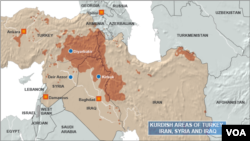DIYARBAKIR, TURKEY —
Tensions in heavily Kurdish areas of Turkey are highlighting how the nation's decades-old "Kurdish question" remains unresolved.
Turkey's prime minister says the government has given Turkey's Kurds unprecedented freedoms.
But most Kurds say they continue to suffer discrimination and alienation. And there are increasing skirmishes between Turkish forces and Kurdish insurgents, causing an outcry among Turks and harsh crackdown rhetoric from Ankara.
At the Tigris-Euphrates Cultural Center in Diyarbakir, inside the walls of the Old City, Kurds are trying to revive traditional Kurdish culture, which has been under threat since the creation of the Turkish Republic nearly 90 years ago.
Center coordinator Farqin, who uses only one name, said the Turkish government wants only one culture, one language, for the country.
"The Turkish government gives us a hard time," he said. "It doesn't want us to do this kind of work."
Farqin said the authorities have broken into the cultural center several times and taken its computers and CDs.
"And they arrest our friends," he said.
Any display of Kurdish culture once was illegal in Turkey.
Restrictions eased
The restrictions have been eased in the past decade - part of what the government says is an unprecedented tide of liberties and education given to Kurds.
But Kurds say arrests and court cases continue and hundreds of artists have been jailed for expressions that are perceived as anti-Turkish.
Veysel Tanrikulu, 25, a recent university graduate, is facing a 10-month prison sentence for singing traditional Kurdish songs at a festival.
Tanrikulu said young people are divided.
One group has lost hope, he said, as Turkish officials vow there is no way the Kurdish language will be taught as an official language. Tanrikulu said the other group is more activist and believes something must be done.
Violent insurgency
Kurdish Percentage of Population
Kurdish Percentage of Population
Iran 10%
Iraq 15 to 20 %
Syria As much as 9.7%
Turkey 18%
Source: CIA World Factbook
Some young Kurds, Tanrikulu said, have become so frustrated that they go to the mountains and join the insurgent PKK, which has been fighting the Turkish state for 28 years.
The PKK - the Kurdistan Workers Party - is viewed as a terrorist group by many Western governments.
There has been an upsurge of clashes between the PKK and Turkish government forces after a decade of relative calm. The PKK says the authorities are trying to sabotage peace negotiations.
The government says the Kurdish guerrillas are being encouraged by the Syrian government and its ally, Iran, because of Turkey's support for Syrian rebels fighting the Damascus government.
Ahmed Gezen, deputy chairman of the Diyarbakir branch of the Peace and Democracy Party, said Kurds are only seeking a democratic Kurdish-run government in Kurdish parts of Turkey.
Some consider the party to be the political wing of the PKK although it denies this.
"Why do so many guerillas and soldiers have to die for this?" Gezen asked of the struggle for Kurdish freedoms.
Bayan Bozyel, who leads the smaller Rights and Freedom Party, advocates Kurdish rights through non-violent means. He said the Turkish government has met some of the Kurds' demands.
Bozyel said the Turkish government has opened a Kurdish language television station and is allowing optional courses in Kurdish in some schools. But Bozyel added that it is not enough to solve the Kurdish problem.
Government support
Istanbul University Professor Emre Gonen said that many Kurds in the last election voted for the ruling Peace and Justice Party, or AKP, of Prime Minister Recep Tayyip Erdogan.
Erdogan has said that Kurds are enjoying unprecedented freedoms and political influence. There are some 50 Kurdish members of the governing coalition in parliament.
“There is an immense majority of the Kurdish population that is nicely integrated in Turkey - not that we have been nice to the Kurds - but there is so much inter-penetration between Kurds and Turks - mixed marriages are almost a tradition - that it is not possible to separate them,” analyst Gonen said.
Istanbul University Professor Ayhan Kaya said that many Turks are beginning to acknowledge the injustices of the past against the Kurdish population.
“There is this democratic process within the framework of the Kurdish question," Kaya said. "But what is really problematic recently is the fact that the socio-economic disparities between the east and west, the Kurdish region and other parts of Turkey, is still there.”
















